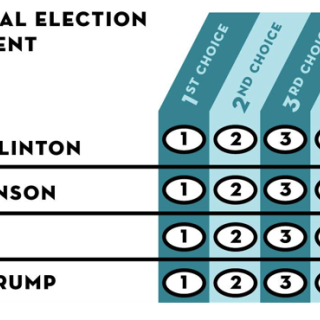Events & Calendars "The Evolution of Voting Systems: How Ranked-Choice Voting Would Improve American Democracy"
Skip to Main Content
Cambridge. San Francisco. Minneapolis. Portland. Santa Fe. What do these cities have in common? They are all using ranked-choice voting (RCV) for local elections. And Amherst and Hadley could be next, along with the Amherst College student government.
This simple enhancement to our current electoral system lets voters rank all candidates on the ballot, and if their top choice doesn't receive enough overall support, their vote transfers to their next choice. They can therefore express their true preferences and not worry about which candidates may have enough support to win. The result is a more vibrant and equitable democracy.
RCV has been in limited use in the United States for a century, in different forms that include “instant runoff voting” and “proportional representation.” But with increasing awareness of the flaws in our democratic systems and the availability of computer tabulation, it is seeing renewed interest across the country. And in June, Maine will become the first state to use ranked-choice voting for non-local elections.
In this panel presentation, the history, application and future use of RCV will be illustrated:
The keynote will be provided by Douglas J. Amy of Mount Holyoke College. He is professor emeritus of politics and a national expert on alternative voting systems and voting system reform. His books on the subject include Behind the Ballot Box: A Citizen's Guide to Voting Systems and Real Choices, New Voices: How Proportional Representation Elections Could Revitalize American Democracy.
In the Town of Amherst on March 27, citizens will vote on a charter revision that would replace its representative town meeting with a town council. The proposal would also lead to the adoption of RCV for local elections. Mandi Jo Hanneke is vice chair of the Charter Commission and a member of town meeting. She will describe how RCV will be implemented if the proposed charter is approved.
At Hadley's town meeting on May 3, citizens will likewise vote on a warrant article to adopt RCV for the election of its select board and other positions. Linda Castronovo is a retired teacher from Amherst Public Schools and Hadley resident who will explain the benefits of using RCV in town government.
In the spring of 2017, Amherst College engaged its students, staff, faculty and alumni in a mammoth decision: what should their new mascot be? Alejandro Nino Quintero '18 was a member of the Mascot Committee and will review their decision to use RCV to determine the final outcome.
Because of the success of the Amherst College mascot election, the Association of Amherst Students is proposing the use of RCV for the election of the members of the student government. Jénine Shepherd '20, chair of the Judiciary Council, and will discuss their considerations.
Many more opportunities to use RCV are on the horizon in Massachusetts, and they will be described by Howard Fain. He is one of the co-founders of FairVote and a member of the Executive Committee of Voter Choice Massachusetts, which are both nonpartisan organizations that are dedicated to educating the public about electoral reforms that increase the range of choice on the ballot and produce fairer outcomes.
This presentation is sponsored by the Roosevelt Institute, a student policy organization that engages new generations in unique, progressive activism that empowers young people as leaders and promotes their ideas for change, and by the Department of Political Science at Amherst College.
Contact Info
 @amherst.edu
@amherst.edu
Directions
Converse Hall is located at 100 Boltwood Ave. on the Amherst College campus. The Cole Assembly Room is on the first floor.